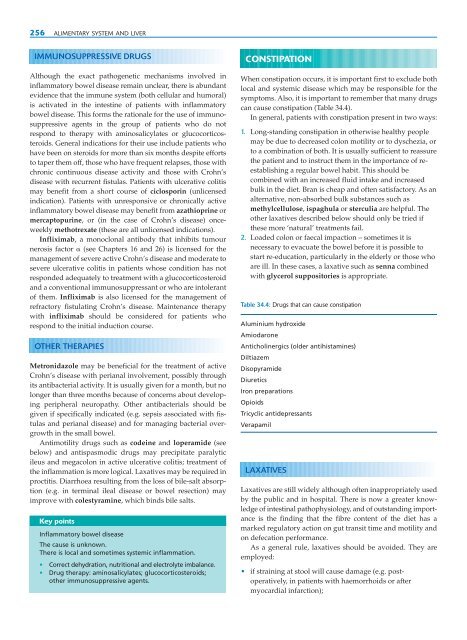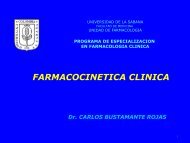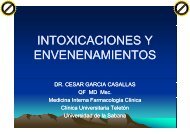Clinical Pharmacology and Therapeutics
A Textbook of Clinical Pharmacology and ... - clinicalevidence
A Textbook of Clinical Pharmacology and ... - clinicalevidence
- No tags were found...
You also want an ePaper? Increase the reach of your titles
YUMPU automatically turns print PDFs into web optimized ePapers that Google loves.
256 ALIMENTARY SYSTEM AND LIVER<br />
IMMUNOSUPPRESSIVE DRUGS<br />
Although the exact pathogenetic mechanisms involved in<br />
inflammatory bowel disease remain unclear, there is abundant<br />
evidence that the immune system (both cellular <strong>and</strong> humoral)<br />
is activated in the intestine of patients with inflammatory<br />
bowel disease. This forms the rationale for the use of immunosuppressive<br />
agents in the group of patients who do not<br />
respond to therapy with aminosalicylates or glucocorticosteroids.<br />
General indications for their use include patients who<br />
have been on steroids for more than six months despite efforts<br />
to taper them off, those who have frequent relapses, those with<br />
chronic continuous disease activity <strong>and</strong> those with Crohn’s<br />
disease with recurrent fistulas. Patients with ulcerative colitis<br />
may benefit from a short course of ciclosporin (unlicensed<br />
indication). Patients with unresponsive or chronically active<br />
inflammatory bowel disease may benefit from azathioprine or<br />
mercaptopurine, or (in the case of Crohn’s disease) onceweekly<br />
methotrexate (these are all unlicensed indications).<br />
Infliximab, a monoclonal antibody that inhibits tumour<br />
nerosis factor (see Chapters 16 <strong>and</strong> 26) is licensed for the<br />
management of severe active Crohn’s disease <strong>and</strong> moderate to<br />
severe ulcerative colitis in patients whose condition has not<br />
responded adequately to treatment with a glucocorticosteroid<br />
<strong>and</strong> a conventional immunosuppressant or who are intolerant<br />
of them. Infliximab is also licensed for the management of<br />
refractory fistulating Crohn’s disease. Maintenance therapy<br />
with infliximab should be considered for patients who<br />
respond to the initial induction course.<br />
OTHER THERAPIES<br />
Metronidazole may be beneficial for the treatment of active<br />
Crohn’s disease with perianal involvement, possibly through<br />
its antibacterial activity. It is usually given for a month, but no<br />
longer than three months because of concerns about developing<br />
peripheral neuropathy. Other antibacterials should be<br />
given if specifically indicated (e.g. sepsis associated with fistulas<br />
<strong>and</strong> perianal disease) <strong>and</strong> for managing bacterial overgrowth<br />
in the small bowel.<br />
Antimotility drugs such as codeine <strong>and</strong> loperamide (see<br />
below) <strong>and</strong> antispasmodic drugs may precipitate paralytic<br />
ileus <strong>and</strong> megacolon in active ulcerative colitis; treatment of<br />
the inflammation is more logical. Laxatives may be required in<br />
proctitis. Diarrhoea resulting from the loss of bile-salt absorption<br />
(e.g. in terminal ileal disease or bowel resection) may<br />
improve with colestyramine, which binds bile salts.<br />
Key points<br />
Inflammatory bowel disease<br />
The cause is unknown.<br />
There is local <strong>and</strong> sometimes systemic inflammation.<br />
• Correct dehydration, nutritional <strong>and</strong> electrolyte imbalance.<br />
• Drug therapy: aminosalicylates; glucocorticosteroids;<br />
other immunosuppressive agents.<br />
CONSTIPATION<br />
When constipation occurs, it is important first to exclude both<br />
local <strong>and</strong> systemic disease which may be responsible for the<br />
symptoms. Also, it is important to remember that many drugs<br />
can cause constipation (Table 34.4).<br />
In general, patients with constipation present in two ways:<br />
1. Long-st<strong>and</strong>ing constipation in otherwise healthy people<br />
may be due to decreased colon motility or to dyschezia, or<br />
to a combination of both. It is usually sufficient to reassure<br />
the patient <strong>and</strong> to instruct them in the importance of reestablishing<br />
a regular bowel habit. This should be<br />
combined with an increased fluid intake <strong>and</strong> increased<br />
bulk in the diet. Bran is cheap <strong>and</strong> often satisfactory. As an<br />
alternative, non-absorbed bulk substances such as<br />
methylcellulose, ispaghula or sterculia are helpful. The<br />
other laxatives described below should only be tried if<br />
these more ‘natural’ treatments fail.<br />
2. Loaded colon or faecal impaction – sometimes it is<br />
necessary to evacuate the bowel before it is possible to<br />
start re-education, particularly in the elderly or those who<br />
are ill. In these cases, a laxative such as senna combined<br />
with glycerol suppositories is appropriate.<br />
Table 34.4: Drugs that can cause constipation<br />
Aluminium hydroxide<br />
Amiodarone<br />
Anticholinergics (older antihistamines)<br />
Diltiazem<br />
Disopyramide<br />
Diuretics<br />
Iron preparations<br />
Opioids<br />
Tricyclic antidepressants<br />
Verapamil<br />
LAXATIVES<br />
Laxatives are still widely although often inappropriately used<br />
by the public <strong>and</strong> in hospital. There is now a greater knowledge<br />
of intestinal pathophysiology, <strong>and</strong> of outst<strong>and</strong>ing importance<br />
is the finding that the fibre content of the diet has a<br />
marked regulatory action on gut transit time <strong>and</strong> motility <strong>and</strong><br />
on defecation performance.<br />
As a general rule, laxatives should be avoided. They are<br />
employed:<br />
• if straining at stool will cause damage (e.g. postoperatively,<br />
in patients with haemorrhoids or after<br />
myocardial infarction);




